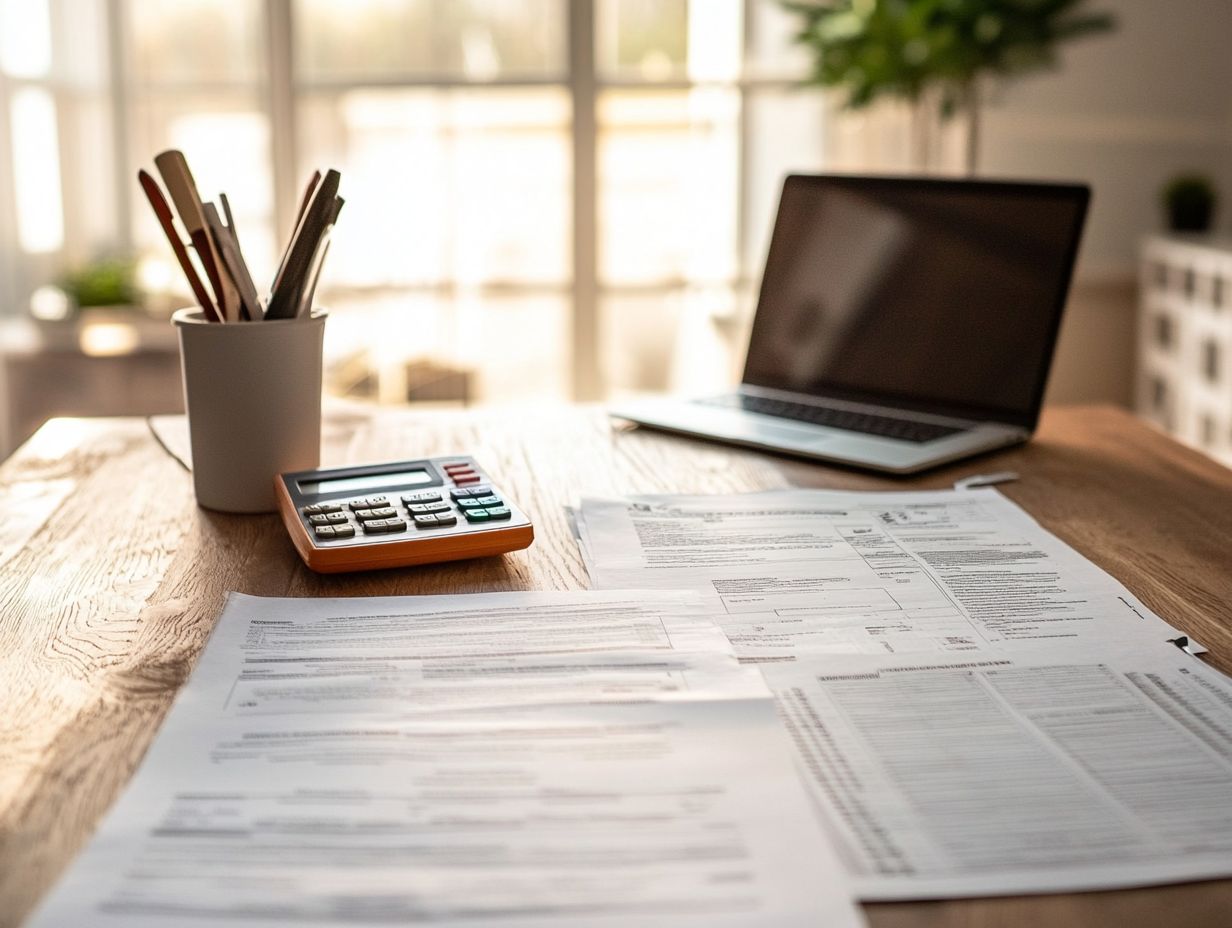Essential Documents for First-Time Home Buyers
Buying your first home is an exhilarating journey, yet it can quickly become overwhelming, particularly when faced with the mountain of paperwork. This guide outlines the essential documents you ll need, from financial statements to legal contracts. It delves into the mortgage application process, helping you grasp the significance of your credit score and the various forms required to seal the deal.
You ll discover valuable resources designed to support you on your path to homeownership. Prepare to embrace this important step with renewed confidence!
Contents
- Key Takeaways:
- Important Documents to Have
- Preparing Your Finances
- Obtaining a Mortgage
- Legal Documents
- Closing the Deal
- Resources for First-Time Home Buyers
- Frequently Asked Questions
- What are the essential documents for first-time home buyers?
- Why do first-time home buyers need to provide these documents?
- Do I need to provide original or copies of these documents?
- Can I submit these documents online?
- What happens if I don’t have all the required documents?
- What can I do to prepare for the document submission process?
Key Takeaways:

- Before beginning the home-buying process, understand the necessary documents required, including financial statements and contracts.
- Prepare your finances by obtaining a good credit score and organizing financial paperwork to make the mortgage application process smoother.
- When applying for a mortgage, be ready to provide documentation such as proof of income, tax returns, and bank statements.
Understanding the Process
Understanding the process of buying a house is crucial for first-time buyers and involves several key steps that can significantly influence your financial decisions. From securing mortgage preapproval to navigating the closing process, each stage demands careful attention to detail and organization.
By collaborating closely with a knowledgeable real estate agent and gathering essential documents like proof of income and employment, you can make informed choices that streamline the entire process. Securing mortgage preapproval helps you establish a budget and boosts your position when it s time to make an offer.
Once you ve identified a suitable property, partnering with a real estate agent becomes invaluable. They provide useful information and negotiation strategies that can give you an edge. It’s crucial to familiarize yourself with the closing process, which includes several legal and financial requirements, such as inspections and title searches.
Each of these steps contributes to a smoother transition into homeownership, enabling you to feel confident as you embark on this significant investment.
Important Documents to Have
Gathering the right documents is your ticket to a smooth home-buying experience! This not only streamlines the loan application process but also ensures compliance with all legal requirements.
Key documents include your proof of income, credit report, and the purchase agreement, along with any other financial paperwork that lenders typically request for mortgage approval. You’ll also want to gather items like bank statements and tax returns to showcase your financial history and capability. This preparation will make your home-buying journey more efficient.
List of Essential Documents
A comprehensive list of essential documents is crucial for you as a prospective home buyer to ensure a successful transaction and avoid complications. To navigate this process smoothly, consider following the steps to secure a first-time home buyer loan. Key documents include:
- A home inspection report, which provides insights into the property’s condition.
- Title insurance to protect against ownership disputes.
- An earnest money deposit, a sum of money that shows you are serious about buying the house.
Keeping a favorable credit score is essential for securing the best mortgage rates and terms during your buying journey. Having access to a well-organized set of these documents streamlines the buying process and instills confidence in you, knowing that you re making a well-informed investment.
The home inspection report reveals any existing issues, allowing you to negotiate repairs or adjustments before finalizing the sale, which can influence your future financial obligations. Title insurance acts as a protective barrier, shielding you from potential litigation due to previous ownership conflicts, while the earnest money deposit serves as a gesture of good faith, enhancing your bargaining position.
By staying proactive about your credit health, you elevate your chances of securing advantageous mortgage terms, paving the way for a smooth journey into homeownership. Start your journey today and step confidently into your new home!
Preparing Your Finances
Preparing your finances is a crucial step in the home-buying journey. This involves not just assessing your budget but also saving diligently for that all-important down payment. Additionally, ensure your financial paperwork is meticulously organized.
As a buyer, gather essential documents, including:
- Proof of identity
- Income verification
- A comprehensive overview of your financial situation think bank statements and investment accounts.
By taking the time to prepare your finances properly, you ll enhance your chances of securing mortgage preapproval. This also enables you to make informed decisions throughout the entire buying process.
Credit Score and Financial Statements

Your credit score is a crucial factor in the home buying process. It directly affects the terms and rates that mortgage lenders offer. A higher credit score can help you get better loan estimates and lower interest rates.
Familiarize yourself with your financial statements and take proactive steps to enhance your creditworthiness if needed. By focusing on your financial decisions now, you position yourself more favorably for mortgage approval.
Being mindful of your credit score is important, but regularly reviewing your financial statements is equally crucial. This helps you spot outstanding debts, errors, or unnecessary expenditures that might negatively impact your financial health.
Addressing these issues boosts your credit score over time and fosters a deeper understanding of personal finance. Consequently, you ll be equipped to make informed budgeting choices and save for a down payment, setting the stage for a smoother home buying experience.
Obtaining a Mortgage
Securing a mortgage is a pivotal step in your home buying journey, providing the essential financing needed to acquire your property. Generally, the journey begins with mortgage preapproval, where you’ll submit various documents to lenders to gauge your eligibility for a loan.
Understanding closing costs and other related expenses is vital for making informed financial choices. This ensures that your transition to homeownership is as smooth as possible.
Application Requirements and Process
The loan application process requires you to meet several criteria to qualify for a mortgage. Start by submitting various financial documents. You ll typically need to provide proof of ownership, current income, and evidence of your financial stability, such as tax returns and bank statements.
Hitting the minimum credit score set by lenders is crucial for securing that coveted mortgage loan. Prepare to present identification documents, like your driver s license or passport, along with recent pay stubs and proof of any additional income sources.
Lenders will scrutinize these financial records closely to assess your repayment ability. This highlights the importance of maintaining a robust credit history.
A solid credit score not only impacts your chances of approval but also plays a significant role in determining the interest rates you’re offered. By understanding these factors, you empower yourself as a prospective homeowner, guiding you toward more favorable mortgage options.
Legal Documents
Legal documents play a pivotal role in the home buying process. They safeguard both parties and facilitate a seamless transaction.
Key documents include:
- Closing papers that detail the terms of the sale,
- Title reviews to verify ownership rights,
- Sellers’ disclosures that deliver critical insights about the property.
Grasping the nuances of these documents is essential for you as a buyer. This understanding enables you to protect your interests and steer clear of potential disputes.
Contracts and Agreements
Contracts and agreements are the bedrock of any real estate transaction, providing clarity and legal protection for both buyers and sellers. The purchase agreement lays out the terms of the sale, while the earnest money deposit shows you’re serious about buying the home. It’s a sum of money you put down to secure the purchase.
An offer letter is your way of presenting a proposal to the seller, kickstarting negotiations that could ultimately lead to a successful agreement.
These documents do more than just set expectations; they outline the responsibilities of each party and incorporate essential elements like contingencies, inspection clauses, and timelines.
Contingencies are your safety net. They allow you to walk away if certain conditions aren’t met such as securing financing or passing that all-important home inspection.
Remember, these agreements are legally binding, meaning both parties have options if the terms aren’t honored. With a solid grasp of these components, you can navigate the home buying journey with confidence, reassured that your interests are safeguarded every step of the way.
Closing the Deal

Closing the deal is an exciting milestone in your home buying journey! This step requires careful attention to detail to ensure a successful transaction.
You ll want to review the closing disclosure carefully. This document details the final costs related to the sale, including any closing costs and additional fees.
Once you ve given it the thumbs-up, you ll typically need to present a cashier’s check to cover these expenses while you finalize the documents that will officially transfer ownership of the property to you.
Finalizing Documents and Paperwork
Finalizing documents and paperwork is crucial in the closing process. It ensures that every piece of information is accurate and complete before ownership changes hands.
You must present proof of identity and verify your financial decisions, such as obtaining homeowners insurance to protect your investment.
Carefully review all closing documents, as inaccuracies could lead to complications. Ensure financial disclosures are clear and organized, including any pre-approval letters or payment records.
A thorough review of title documents is equally essential, as addressing any outstanding liens can help prevent potential disputes.
Consulting with real estate professionals can offer invaluable insights and clarity, further reducing the risks associated with missing or erroneous information.
By prioritizing accuracy during this pivotal phase, you can move forward with confidence, facilitating a smoother transition to new ownership.
Resources for First-Time Home Buyers
For first-time home buyers, having access to trustworthy resources can significantly enhance your experience as you navigate the intricacies of purchasing a home.
Quality websites can offer valuable insights into financial decisions, link you with seasoned real estate agents, and provide information on mortgage lenders tailored to your specific needs.
By leveraging these resources, you can become more informed and well-prepared, making your journey into homeownership smoother and more confident.
Useful Websites and Tools
Several valuable websites and tools can guide you as a first-time home buyer, enabling you to make informed decisions.
For instance, Bankrate is an excellent resource for financial advice and mortgage calculators. This platform helps you grasp different loan options and compare interest rates, enabling you to find the most affordable financing available.
Real estate professionals like Dena Landon and Taryn Tacher provide expert guidance. They share essential tips and insights into local market trends that can help you make smart investments.
For a more personalized touch, HomeLight and iLove Realty excel at connecting you with top-rated agents who can expertly navigate the complexities of purchasing a home.
By leveraging these effective resources, you can boost your confidence, streamline the purchasing process, and ultimately secure a property that perfectly fits your needs and budget.
Frequently Asked Questions
What are the essential documents for first-time home buyers?

First-time home buyers need a few key documents. These include a government-issued ID, proof of income, bank statements, tax returns, a credit report, and proof of your job status. It’s also helpful to refer to the home buying timeline for first-time buyers to ensure you’re fully prepared.
Why do first-time home buyers need to provide these documents?
Lenders need these documents to verify who you are and your financial situation. This helps them decide if you qualify for a mortgage and how much you can borrow.
Do I need to provide original or copies of these documents?
Lenders usually want original copies of your documents. Sometimes, they accept electronic copies or photocopies if a notary or authorized agent certifies them.
Can I submit these documents online?
Many lenders allow you to submit documents online through secure portals. This makes the process easier and faster for first-time home buyers.
What happens if I don’t have all the required documents?
If you re missing any documents, don t wait! Tell your lender right away. They might offer alternatives or give you time to gather what you need.
What can I do to prepare for the document submission process?
Gather all your required documents ahead of time. Double-check that everything is accurate and up-to-date to speed up the loan approval process.






